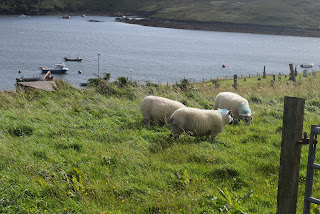 The village of Crossbost (Crosbost in Gaelic), where we are staying, is small yet charming and has a lot of history. It remains a crofting village and the field behind our house often sees sheep feeding. With about 40 houses in the villages it stretches along one road for about a mile and also has houses on the Ranish road and has a few houses as the B867 turns right out of the village. So the houses are well spaced apart.
The village of Crossbost (Crosbost in Gaelic), where we are staying, is small yet charming and has a lot of history. It remains a crofting village and the field behind our house often sees sheep feeding. With about 40 houses in the villages it stretches along one road for about a mile and also has houses on the Ranish road and has a few houses as the B867 turns right out of the village. So the houses are well spaced apart.
The Hebradian Connections site explains that Crossbost was formed as a village in 1843 when parts of the South Lochs area were cleared as part of the imposition of land-ownership on the Hebrides with its traditional culture of shared land belonging to the community not the landlord. The inhabitants were forced to resettle in North Lochs. Before the resettlement Crossbost (farm at the cross, is probably the closest English description) had been just a small farm. Evidence of the extensive walls of the farm can still be seen at the east end of the village.
Those who settled in Crossbost had a very difficult time, stories are still told of the people spending their first winter in Crossbost under upturned boats. It is only lucky that the Hebredian weather is not as varied as elsewhere in Northern Scotland. With the impact of the Atlantic leading to average lows of 2C rather than freezing and below which occurs on the mainland.
Informed by our reading we spent Monday evening exploring the village. The weather stayed dry and bright and even though we had been out for seven hours already after an hour and a half we were ready to go our again.
 So at 5.00pm we went for a stroll, first down to the harbour of Crossbost past the cemetery (which includes some Commonwealth War Graves) and past the war memorial and down to the harbour. The size of the war memorial, for such a small part of the country provides a salutatory thought. The Hebrides as a whole lost a disproportionate number of men to both world wars and tiny villages here have large memorials, where smaller ones would appear in similar size villages elsewhere.
So at 5.00pm we went for a stroll, first down to the harbour of Crossbost past the cemetery (which includes some Commonwealth War Graves) and past the war memorial and down to the harbour. The size of the war memorial, for such a small part of the country provides a salutatory thought. The Hebrides as a whole lost a disproportionate number of men to both world wars and tiny villages here have large memorials, where smaller ones would appear in similar size villages elsewhere. The sun shone over the loch and the views were delightful, so we walked a bit further to the next village - called Leurbost and then back ready to cook dinner.
The sun shone over the loch and the views were delightful, so we walked a bit further to the next village - called Leurbost and then back ready to cook dinner. Tonight I had decided to cook an old favorite of ours Larb Moo, this is my adaptation of a more famous Thai dish Larb Gai - Gai being Chicken, Moo being Pork. I was impressed that Tesco in Storoway had Lemon Grass and the other makings of this dish. Served with basmati rice (yes Basmati is Indian, but long-grain rice of any kind is perfect with Thai food) it took 10 minutes to chop and 15 minutes to cook and, of course I would say this, it was delicious, Drew agreed.
Tonight I had decided to cook an old favorite of ours Larb Moo, this is my adaptation of a more famous Thai dish Larb Gai - Gai being Chicken, Moo being Pork. I was impressed that Tesco in Storoway had Lemon Grass and the other makings of this dish. Served with basmati rice (yes Basmati is Indian, but long-grain rice of any kind is perfect with Thai food) it took 10 minutes to chop and 15 minutes to cook and, of course I would say this, it was delicious, Drew agreed.
We had some fruit for dessert and went to bed at 10, ready for another busy day tomorrow.





Some great pictures here.
ReplyDeleteThanks Robin,
DeleteAll Drew's work of course.
When Flickr allows me to upload there will be lots more.
Some great pictures here.
ReplyDelete